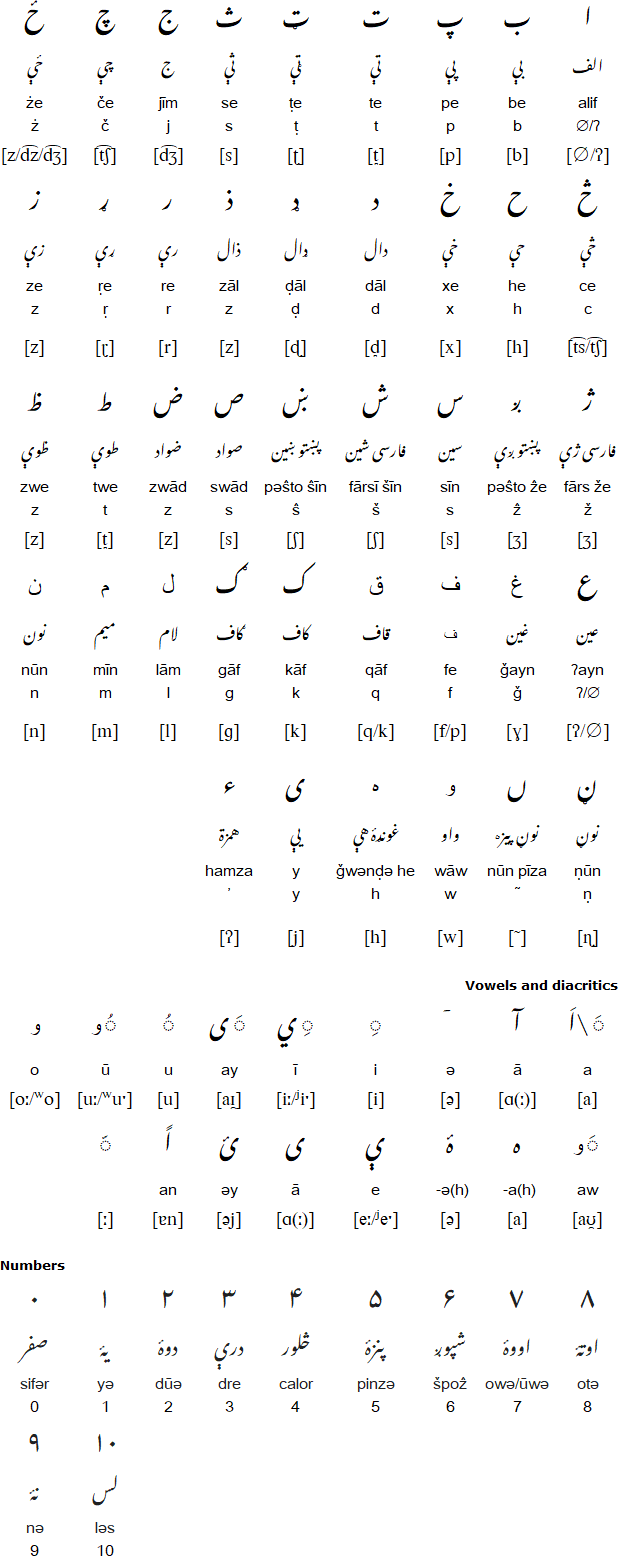Wanetsi is an Eastern Iranian language spoken by about 141,000 people in Balochistan province in the southwest of Pakistan, particularly in Harnai and Chawter in the Sanjawi subdivision in the northeast of Balochistan.
Wanetsi is also known as Chalgari, Tarino, Vanechi, Wanechi or Waneci. It is closely related to Pashto, particularly Southern Pashto, and is consider a dialect of Pashto by some people.
Wanetsi can be written with a version of the Arabic alphabet.

Download an alphabet chart for Wanetsi (Excel)
Details of the Wanetsi alphabet provided by Wolfram Siegel, with corrections and additions by Michael Peter Füstumum
نيکۀ څېنه بړ سړا ده څۀ اړ توني چي بسيا ده
خپل وېل مندې دې پای او خپله توره یې ساتیا ده
پیني چرته رسېده ده موش ته پاته اومبې پلا ده
یه وږده توره تارۀ ده پچي هر خپل پرېدا ده
شپون ولس د کوڼ و کونګ ده هر سړا ځان ته بلا ده
Nīkə cena bəṛ saṛā da cə āṛ tūnī čī basiyā da.
Xpəl wel mənde de pāy āw xpla tūra ye sātyā da.
Pīnī čərta raseda da mūš ta pāta ombe plā da.
Ya wuẑda tora tārə da pčī har xpəl paredā da.
Špūn wuls dә kūṇ wә kūng da har saṛā źān ta balā da.
How strong/capable grandfather is, that in a hill-locked place [lit. tied place] he is prosperous.
That on his own sustenance he survives, he has kept his own bravery [lit. sword].
The world has reached where [advanced], how much of a journey we have left for us.
There is a long darkness, in it every relative is a stranger.
The shephard nation is blind and dumb, every man is a constitution to oneself.
Part of a poem by Nizamuddin Nizami Tarin
Source: https://en.wikipedia.org/wiki/Wanetsi#Poetry
Information about Wanetsi
https://en.wikipedia.org/wiki/Wanetsi
https://www.ethnologue.com/language/wne
Avestan, Bactrian Baluchi, Bartangi, Dari, Gilaki, Hazaragi, Ishkashimi, Judeo-Persian, Juhuri, Khufi, Kumzari, Kurdish, Luri, Mazandarani, Munji, Ossetian, Ormuri, Oroshor, Persian, Parthian, Pashto, Rushani, Sanglechi, Sarikoli, Shabaki, Shughni, Tajik, Talysh, Tat, Wakhi, Wanetsi, Yaghnobi, Yazghulami, Yidgha, Zazaki
Adamaua Fulfulde, Afrikaans, Arabic (Algerian), Arabic (Bedawi), Arabic (Chadian), Arabic (Egyptian), Arabic (Gulf), Arabic (Hassaniya), Arabic (Hejazi), Arabic (Lebanese), Arabic (Libyan), Arabic (Modern Standard), Arabic (Moroccan), Arabic (Najdi), Arabic (Sudanese), Arabic (Syrian), Arabic (Tunisian), Arwi, Äynu, Azeri, Balanta-Ganja, Balti, Baluchi, Beja, Belarusian, Bosnian, Brahui, Chagatai, Chechen, Chittagonian, Comorian, Crimean Tatar, Dargwa, Dari, Dhatki, Dogri, Domari, Gawar Bati, Gawri, Gilaki, Hausa, Hazaragi, Hindko, Indus Kohistani, Kabyle, Kalkoti, Karakalpak, Kashmiri, Kazakh, Khowar, Khorasani Turkic, Khwarezmian, Konkani, Kumzari, Kurdish, Kyrgyz, Lezgi, Lop, Luri, Maguindanao, Malay, Malay (Terengganu), Mandinka, Marwari, Mazandarani, Mogholi, Morisco, Mozarabic, Munji, Noakhailla, Nubi, Ormuri, Palula, Parkari Koli, Pashto, Persian/Farsi, Punjabi, Qashqai, Rajasthani, Rohingya, Salar, Saraiki, Sawi, Serer, Shabaki, Shina, Shughni, Sindhi, Somali, Soninke, Tatar, Tausūg, Tawallammat Tamajaq, Tayart Tamajeq, Ternate, Torwali, Turkish, Urdu, Uyghur, Uzbek, Wakhi, Wanetsi, Wolof, Xiao'erjing, Yidgha
Page created: 10.11.21. Last modified: 06.10.22
[top]
You can support this site by Buying Me A Coffee, and if you like what you see on this page, you can use the buttons below to share it with people you know.

If you like this site and find it useful, you can support it by making a donation via PayPal or Patreon, or by contributing in other ways. Omniglot is how I make my living.
Note: all links on this site to Amazon.com, Amazon.co.uk
and Amazon.fr
are affiliate links. This means I earn a commission if you click on any of them and buy something. So by clicking on these links you can help to support this site.
[top]